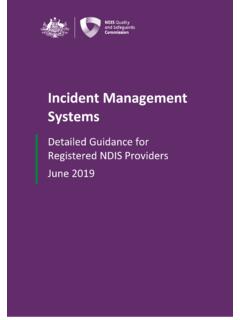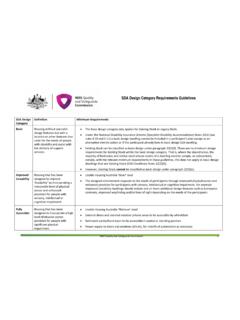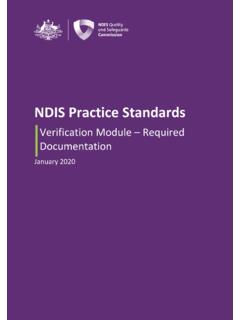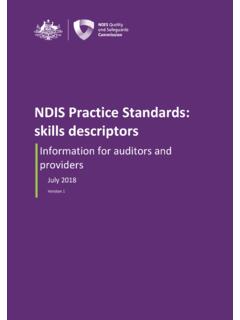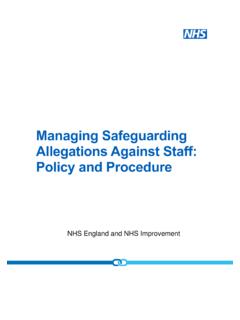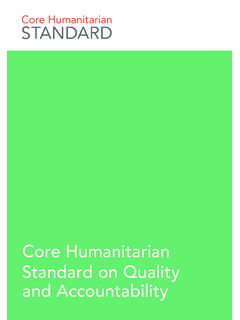Transcription of Compliance and Enforcement Policy - NDIS Quality and ...
1 Compliance and Enforcement Policy June 2018 Table of contents Table of contents i Compliance and Enforcement 1 Regulatory framework 1 Human Rights 2 Procedural fairness 2 Compliance and Enforcement strategy 2 Administrative measures 3 The Compliance pyramid 3 Educate and persuade 4 Investigations 5 Compliance notices 6 Enforceable undertakings 6 Injunctions 7 Civil penalties 7 Vary, revoke or suspend registration 8 Banning orders 9 Reviewable decisions 9 1 Compliance and Enforcement Monitoring and Compliance is important to the NDIS Quality and Safeguards Commission s work as a regulator.
2 It is one of the ways that the NDIS Commission can encourage best practice among NDIS providers and manage risk to NDIS participants. The NDIS Commission will work with NDIS providers to help them comply with the new Quality and safeguards requirements, including through education and training about their obligations. The NDIS Commission will monitor registered providers for Compliance with the conditions of their registration. Most registered providers must undergo a periodic audit that assesses their performance against the NDIS Practice Standards.
3 By knowing more about what happens in the NDIS marketplace, the NDIS Commission can work to support ongoing improvement. The NDIS Commission will also investigate complaints and reports of non- Compliance with the NDIS Practice Standards, Code of Conduct and other Quality and safeguards requirements where they apply. The NDIS Commission will have the power to investigate any matters relating to registered and unregistered providers and workers. It can impose penalties, including, in the most serious cases, banning workers, de-registering providers and seeking civil penalties.
4 In determining its response to non- Compliance , the NDIS Commission and Commissioner considers a range of factors including: the impact of non- Compliance on the person with disability, and the broader community whether there is any immediate or ongoing risk to the well-being of the NDIS participant the seriousness of any non- Compliance and the actual or potential harm or consequences how far below acceptable standards the conduct falls and the extent to which the provider contributed to the risk, including whether it was intentional, reckless, negligent or a mistake potential to return the provider to full Compliance , and as soon as possible.
5 Regulatory framework The NDIS Commission s regulatory powers and functions are set out in the National Disability Insurance Scheme Act 2013, (the Act) and associated Rules. These functions are developmental, preventive and corrective, and target individuals, the workforce and providers to: strengthen and build capacity prevent harm and improve the Quality of services resolve problems and provide oversight. NDIS Quality and Safeguards Commission 2 Non- Compliance may be handled using a mix of tools including education, capacity building and development for people with disability (and their NDIS providers and workers), complaints handling, Compliance and Enforcement functions and related powers.
6 The NDIS Commission will take a responsive and proportionate approach to regulation, applying the strongest actions to the most serious issues and breaches. Human Rights The NDIS Commission will undertake its regulatory functions in accordance with the NDIS Act and with due regard to the United Nations Convention on the Rights of Persons with Disabilities (the Convention). The NDIS Commission aims to uphold the rights of people with disability, as part of Australia s commitment to the Convention, to prevent exploitation, violence and abuse of people with disability.
7 The NDIS Commission achieves this through: balancing the need to provide appropriate protections, with the need to enable people with disability to exercise choice and control focussing on building the capacity of people with disability, their families and carers to make informed decisions about NDIS providers and pursue concerns or complaints supporting a responsive and effective NDIS market for disability supports and services. Procedural fairness In exercising Compliance , investigation and Enforcement powers, the NDIS Commission will adhere to the requirements of procedural fairness which means: the actions of the Commission and staff will be impartial any person directly and adversely affected by a decision will have an opportunity to respond the Commission will provide reasons for any decision, findings or recommendation.
8 Compliance and Enforcement strategy The NDIS Commission aims to achieve a balance between supporting people with disability to make informed choices, while also promoting high Quality supports and services with appropriate safeguards to support the development of a responsive and effective NDIS market. To achieve these objectives, the NDIS Commission will engage the following integrated strategies: encourage Compliance with the law by educating and informing providers, participants and others about their rights and responsibilities under the Act work with other agencies to implement these strategies, including through coordinated approaches and appropriate referrals analyse emerging risks to identify potential market risks to inform Compliance and Enforcement measures, and identify priorities for regulation NDIS Quality and Safeguards Commission 3 enforce the law.
9 Including through the use of administrative action and by initiating formal Enforcement proceedings where that is necessary and appropriate. If the NDIS Commission has concerns that an NDIS provider may not be complying with legislative requirements, or may become unable to comply, the focus of the NDIS Commission s approach is to engage with the NDIS provider to support Compliance . Relevant considerations for the NDIS Commission in determining what, if any, further actions are to be taken will include: whether the provider has an understanding of the problem; whether the provider demonstrates a willingness to act to address the problem; whether the provider has a history of non- Compliance ; whether the non- Compliance appears to be serious or systemic.
10 Administrative measures may enable earlier resolution than court action, and may also lend themselves to achieving appropriate and timely outcomes that are in the participant, provider and/or public interest. Administrative measures Administrative measures taken to support choice, control and Quality services for NDIS participants and an effective NDIS market may include: revision of practice and procedure supporting the implementation of an effective complaints or incident management system requiring a person/provider to take a particular action, such training in risk management to avert future breaches providing information to parties to help them resolve a matter caution notices or formal advisory letters requiring future Compliance directed audits enforceable undertakings publication of a contravention.


